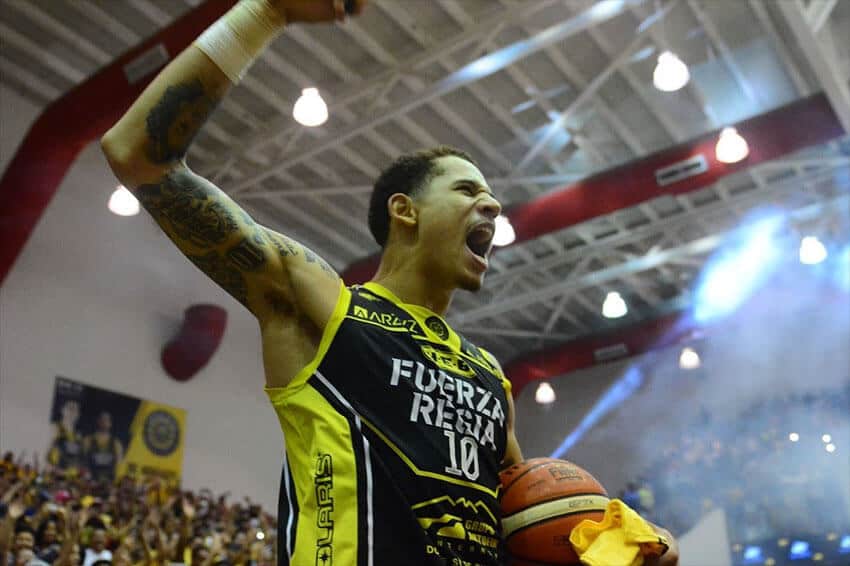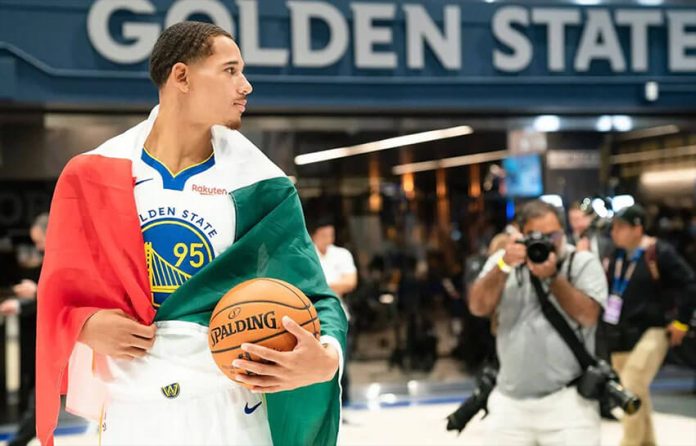The NBA title won by the Golden State Warriors on Thursday night included a significant piece of history for basketball fans from Baja California to Chiapas: Juan Toscano-Anderson became the first Mexican NBA champion.
“JTA” — as he is often called by fans of the former Oakland team that now has its home arena in San Francisco — didn’t get to play in his team’s series clinching 103-90 victory over the Boston Celtics in Game 6 of the NBA Finals, but that didn’t stop him from celebrating in the best way he knew how: grabbing the tricolor flag as he and his Warriors teammates whooped it up on the court in Boston after the game.
Though he was not born in Mexico, Toscano-Anderson was immersed in Mexican culture while being raised in Oakland, California, in the 1990s and early 2000s, largely because his mother, Patricia Toscano, had emigrated from Michoacán a few decades earlier, along with her father.
“Despite me being born in the States, I consider myself Mexican,” he told The Pajaronian newspaper in 2019, when he was playing for a Warriors’ minor league team in Santa Cruz, California.
His professional career started a few years before that in the Liga Nacional de Baloncesto Profesional (LNBP) in Mexico. After not being selected in the 2015 NBA draft following four nondescript seasons at Marquette University, he played one season with the Mexicali Soles and two seasons for the Monterrey Fuerza Regia.
“Sometimes I miss Fuerza Regia and Monterrey, really. Someday I want to return to the LNBP to play for a year or two,” said Toscano-Anderson, who is 29 years old and 1.98 meters (6 feet, 6 inches) tall. While in Mexico, he was named the league MVP once, made two all-star game appearances and led Fuerza Regia to two league championships — and the name on the back of his jersey was “Toscano,” as opposed to “Anderson” in college.
“Nito,” as he is called by family and friends, is all about his Mexican roots. During his three seasons with the Warriors, he often has taken pictures with the Mexican flag and donned tricolor items. When he competed in the NBA Slam Dunk Contest in February, not only did he take second place, but he did it wearing a pair of tricolor Nike sneakers and a specially designed, tricolor-tinged Warriors jersey.
Going into the NBA Finals, there was a lot of attention on him as the first player of Mexican heritage to make it that far in the playoffs. “I want to thank all my people from Mexico,” he said on the sports website Archysport. “I am doing this for Mexico and hopefully I can take the trophy to Mexico and celebrate in Monterrey, Cancún, Michoacán, Mexico City. I’m going to be there this summer and hopefully I can bring the trophy to celebrate with all of you.”
Juan Toscano-Anderson’s Mexico-themed Warriors jersey and kicks for the dunk contest 🇲🇽🔥 pic.twitter.com/bZjEtKnntn
— NBA on ESPN (@ESPNNBA) February 20, 2022
Two years ago, on an off-season visit to Mexico with some of his Warriors teammates, while they were enjoying beach time, Toscano-Anderson was on an outdoor basketball court in Monterrey signing autographs for hundreds of elementary school students.
“I felt like a rock star, man,” he told the San Francisco Chronicle newspaper. “What Steph [Curry] and those guys are like [in the U.S.], that’s kind of what I’m like in Mexico. And I say that humbly. It’s just a total honor.”
Toscano-Anderson was in the final year of his contract this season, so it remains to be seen if he will return to the Warriors next season. He has played parts of three seasons with the team, and though the Golden State dynasty has won four NBA titles in the past eight years, the latest one was a big one for Toscano-Anderson since it was his first.
In addition to playing pro ball in Mexico, he also played in leagues in Venezuela and Argentina and had a stint with the Mexican national team in a pre-Olympic tournament.

He got his big chance by doing well at an open tryout in 2018 and getting signed to play with the Warriors’ minor league team in Santa Cruz, California. He made his NBA debut at the advanced age of 26 during the 2019-20 season, but played in only 13 games that year. Last season, he went back and forth between Golden State and Santa Cruz on a two-way contract, and this season he earned $1.7 million.
In an interview with the newspaper El Heraldo, he said, “I don’t do it for money. I don’t care if I’m on a two-way deal or making $2 million a year. I wake up every day for the love of this sport.”
Toscano-Anderson’s No. 95 jersey is a nod to his maternal grandfather, who moved from Chavinda, Michoacán, in the 1960s and bought a house on 95th Avenue in Oakland. “Nito” grew up there with his Mexican mother and Puerto Rican father, and much of his upbringing involved celebrating Mexican holidays, constantly hearing Spanish all around him and eating his grandmother’s Mexican food.
He is the NBA’s first player of Mexican descent since Jorge Gutiérrez in 2016. Other former NBA players with Mexican blood include Eduardo Nájera, Gustavo Ayón and Horacio Llamas.
With reports from Infobae, Mediotempo and El Universal
